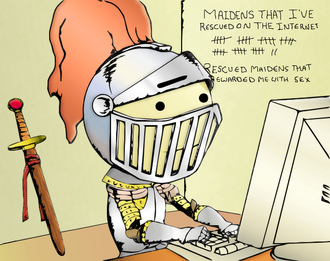Today I want to talk about teh menz. Men in feminism
are great. I really admire them and have had some really great discussions with
them.
But there’s also a problem with male allies. They
tend to have the “white knight” complex more than they should. What this means
is that they’d rather say they are a feminist in order to impress somebody (I
really don’t know who. Potential romantic partners? Themselves?) than actually BE
feminists.
Because being a feminist means a lot more than
saying you’re a feminist. I wrote this post about how not every feminist should
feel the need to be a super marching, protesting activist. That’s still true.
But even if you aren't sticking it to the man is in a very obvious and dramatic
way, there are still small ways that you need to do it. More than BEING a
feminist, you need to actively make the world more feminist in some way.
So what do I even mean? How does one strike the
balance between activist and small efforts?
For one, you need to live your life in a more
feminist way. This will mean different things for different people, and it’s up
to you to determine what that will look like in your own life. It’s not enough
to say that men can often treat women terribly, or that women should be treated
better by society in general. Yes, admitting that women are oppressed is the first
step. The next is working against it.
How, you ask? These are a few suggestions:
Men:
- Examine the balance of housework between you and your wife/partner. Splitting it 50/50 isn’t the answer for every circumstance, but are you doing your fair share? Do you avoid tasks that don’t seem like “men’s work”? Does your wife/partner pick up the slack most of the time? If so, it’s time for you to actively rearrange your situation. (By “actively,” I mean discussing it with her and agreeing on it, not just making a resolution to do better.)
- Same thing with childcare.
- Do you speak out when your dudebros say offensive or sexist things? If not, you are helping perpetuate the problem.
- When you are on the streets, in a bar, or other situation, do you actively work to make sure the women around you feel safe? This doesn’t mean being chivalrous. What I mean is, if a woman is walking alone at night, cross the road and walk on the other side of the street so she doesn’t feel threatened by you. Seriously, you need to do that, because every woman is going to view you as a potential rapist whether you deserve it or not.
- Do you actively work to make women more comfortable in the workplace? This means not interrupting them, encouraging/allowing them to speak out, creating better conditions for women, speaking up when dudebros say sexist things, and mentoring them. Check out “Lean In” by Sharyl Sandberg for more tips on that.
- Listen more. Do not dismiss the experiences of women. Pause before speaking up.
Women:
- Let men do all of the above things. Sometimes, women also have a hard time letting go of the status quo. It can sometimes be difficult for women to hand over the fair share of housework to men because they like the level of control they feel, or they don’t trust men to do it right. That’s dumb. Let it go. Let him make mistakes. Similarly, women don’t always want to give up the benefits that chivalry gives them. I’ll admit that I've felt special before when a guy opens a car door for me, or a group of men stand up when I walk into a room. I don’t anymore, because I hate chivalry. But I understand that feeling.
- Demand that men do the above things. You absolutely cannot wait for men to figure it out by themselves. Why would anybody do that? If you are unhappy with your present circumstances, speak up about it. No, you don’t want to be accusatory or call them a huge flaming ball of suckfest. But an open, honest discussion about your feelings is necessary. (“Demand” may be the wrong word because I do think that, lots of the time, you should be nice about this. But I’m keeping it because what I mean is that you shouldn't give up or settle for less. Stay firm in your stance and resilient in your efforts to get it.)
Really, this is all the tip of the iceberg. I could
probably go on forever talking about ways that we can all work towards a
better, more women-friendly world. Many other blogs have done so in a much
better way than I have. I just needed to vent about the men who are feminist
only in name, and not in action.
Do you have any experiences where this has happened
to you? Do you have any other suggestions? Feel free to share!












